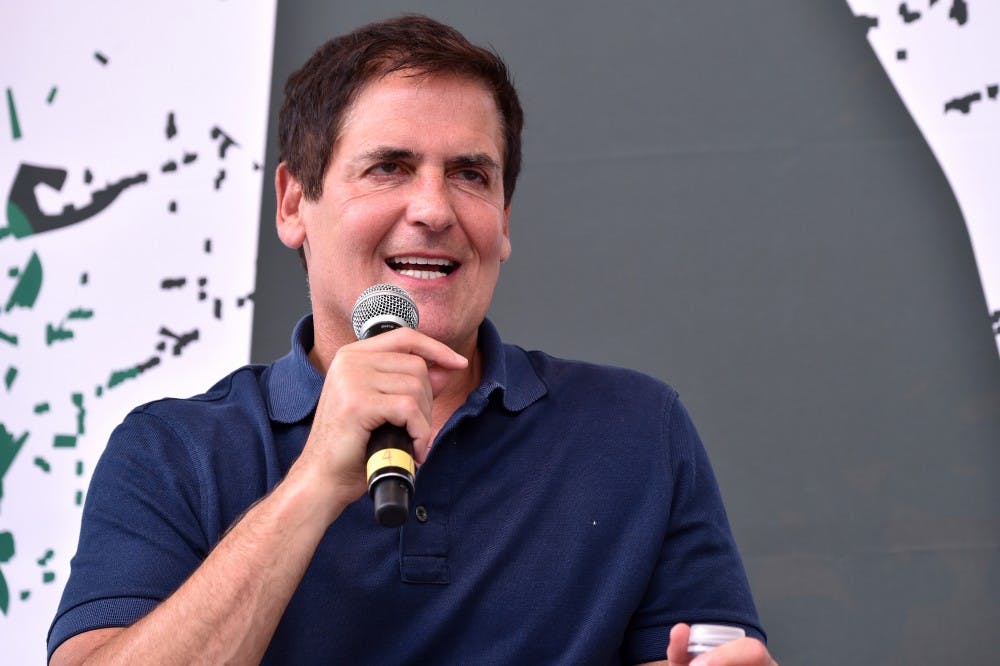As Rachel Nichols opened her Sept. 19 interview with Mark Cuban on ESPN’s NBA program “The Jump,” the mercurial Mavericks owner literally sat on the edge of his seat.
Nervously sipping from a mug, Cuban appeared tense — almost cowering in his chair. His torso leaned over the glass table where he and Nichols sat.
Never one to mince words, this was a Mark Cuban I had not seen before. The bashful billionaire was visibly in a bind.
“You run an NBA franchise where you've talked a lot publicly about how you know everything that goes on there,” Nichols began. “You did know of a few of these isolated incidents."
"But even the best-case scenario of you not knowing, the best version of it is that women in your office felt unsafe coming to work. That they made official complaints to human resources, that they were threatened, they were not promoted. If you just didn't know any of this, how do you explain that?”
For context, Nichols was referring to whether Cuban knew of former marketing and game operations employee Melissa Weishaupt’s claims of rampant sexual abuse and harassment by ex-Mavs CEO Terdema Ussery released by Sports Illustrated in a first-person essay March 20.
Over the course of the nearly seven minute segment, Cuban pled ignorance — seemingly a given for anyone involved in sexual harassment or assault claims these days.
And like those before him, it didn’t help his case.
Perhaps most jarring was when Nichols revealed one of Ussery’s perceived victims came into the office with visible bruising.
“Young African American man, it’s 2014, and I had a decision to make,” Cuban said. “The decision was do I just fire him? My fear in that if I just say ‘Hey you’re fired,’ what’s he going to do next? And what happens to the next person?”
To recap, Cuban justified his decision to not fire Ussery after what — based on Sports Illustrated’s reporting — appeared to be blatant acts of domestic abuse because he was worried Ussery's life would be ruined because he was a “young African American man.”
I’ll admit the race concern here is valid, but that’s beside the point.
Nichols later arrived at the accusations Ussery was watching pornography on his computer at work. Through the investigation it was documented Cuban knew of these allegations and threatened to fire him.
However, there was ultimately no follow up from the Mavericks’ owner after his initial threat.
“Well, I got reports back saying he was on probation and that he was being dealt with,” Cuban remarked. “So I just assumed it was being dealt with. I didn't have any reason to think otherwise.”
Thus, we’ve arrived at the crux of the issue — taking people’s word at what it is.
A few weeks back, I read Bowen McCoy’s 1997 story in the Harvard Business Review entitled “The Parable of the Sadhu.”
McCoy’s piece chronicled his months long trek through the Nepalese Himalayas. Midway through their expedition, the former president and chairman of Morgan Stanley and his hiking party came across an Indian holy man, or Sadhu.
Shivering in the cold with little-to-no clothing, the Sadhu man hinged between life and death. In response, each of the various parties offered little things – a coat, food, drink, etc. – yet no one was willing to take the ultimate plight and help the man down the mountain.
McCoy posited this as an existential question as to why humans are unwilling to take full responsibility.
Over the past decade, countless examples of sexual violence and harassment have been exacerbated by a lack of accountability.
At Penn State, former head football coach Joe Paterno was alerted to claims of child sex abuse against former assistant coach Jerry Sandusky. So too was university president Graham Spanier and athletic director Tim Curley. Sandusky was reprimanded, but never fired.
In October 2012, he was sentenced to between 30 and 60 years in prison for the sexual assault of 10 boys.
Just a few weeks ago, Ohio State head football coach Urban Meyer was suspended for the first three games of the 2018 season because he turned a blind eye to domestic assault allegations against former wide receivers coach Zach Smith.
After his initial remarks to the media, Meyer stated in an interview with ESPN’s Tom Rinaldi his fault was taking the word of others and not asking more questions.
Case. In. Point.
As evidenced, the dilemma of the Sadhu is an almost identical moral controversy to those of the recently surfaced sexual misconduct claims in the sports world.
Of course, the other issue at hand is when one is put in this situation, how would you act?
The easy answer is that you would help the Sadhu, or the woman making her claims.
But as recent history shows, morality doesn’t reign supreme when it comes to sports.






